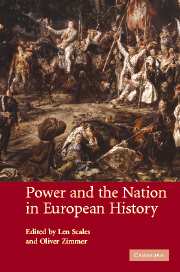Introduction
Published online by Cambridge University Press: 02 December 2009
Summary
Something more than discontent and speculative ingenuity is needed in order to invest a political idea with power over the masses of mankind.
Lord Acton, ‘Nationality’ (1862)The long history of ‘the nation’ as a concept and as a name for various sorts of ‘imagined community’ commands much acceptance. But when did the nation first become a fundamental political factor? This is a question which has been, and continues to be, far more sharply contested. A deep rift still separates ‘modernist’ perspectives, which view the political nation as a phenomenon limited to modern societies, from the views of scholars concerned with the pre-industrial world who insist, often vehemently, that nations were central to pre-modern political life also. Yet the engagement of these two broad camps with each other's distinctive viewpoints has often resembled a dialogue of the deaf. All this has favoured the perpetuation of an increasingly repetitive discussion about the origins of nations and nationalism.
This unfortunate state of affairs could only be improved, we were convinced, by bringing together specialists in the history of the pre-modern and the modern nation to scrutinise the nation's historical relationship with political power. A number of more specific questions appeared to flow naturally from this theme. When, and under what historical circumstances, did the nation become constitutive, rather than simply descriptive, of state power and legitimacy? Can the nation attain political importance only when mature state institutions exist, requiring participation, as against mere acquiescence, from members of the putative national community?
- Type
- Chapter
- Information
- Power and the Nation in European History , pp. 1 - 30Publisher: Cambridge University PressPrint publication year: 2005
- 4
- Cited by

